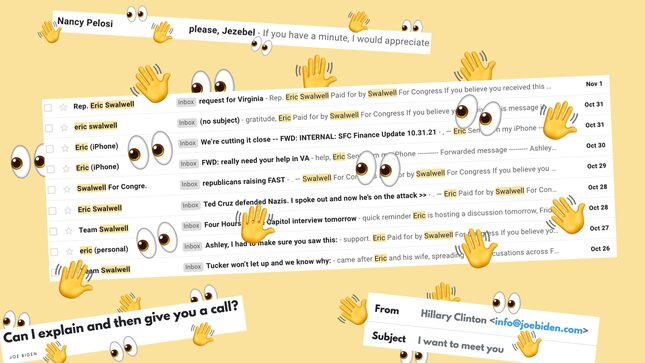Political Fundraising Emails Are Getting Too Horny
Jezebel investigates the increasing desperation and thirst of politics in a digital world.
Politics

“please, Jezebel.”
Some version of this email populates my inbox almost daily from House Speaker Nancy Pelosi, the most powerful woman in American history, like desperate notes from a jilted lover. The subject lines always sound thirsty and are usually in all lower case letters: “please understand, Jezebel;” “desperately;” “urgently;” “please read. don’t delete.” On Halloween, she sent me two: “I’ve had it,” followed sheepishly by, “my final ask.”
This is what it looks like now to even vaguely try to follow politics in the 21st century: an endless deluge of manic emails from powerful people that range from vaguely flirtatious to downright alarming. By the time Democrat Terry McAuliffe lost his bid to become Virginia’s next governor last week, he had managed to annoy all of his supporters, both inside and outside the state—and not with his gaffes or his personality. His campaign, frankly, sent too many fucking emails a day.
“I have received *46* emails today either from Terry McAuliffe’s campaign or about that campaign,” editor Jonathan Cohn vented on Twitter. Alex Shephard of the New Republic compared McAuliffe’s style of “dictating every email his campaign sends out” to that of hapless Simpsons character Gil Gunderson. And in response to a McAuliffe email with the subject line “are we sending too many emails?” (followed by “short answer: NOPE”), a Virginia-based reverend unleashed: “You’ve sent me 9–10 emails *every f-ing day* for the past week. So your answer to this question is galling. I’ve unsubscribed & I don’t ever want to see your campaign in my inbox again.”
Of course, I understand that political fundraising in the digital age relies heavily on email, and a certain amount of begging may be necessary. But it can be a bit unnerving when an influential public figure who represents or is running to represent you is up in your inbox multiple times a day sounding a bit like a cyberstalker, shooting off increasingly pleading and unhinged notes.
I, personally, tend to ignore campaign emails of any sort, mark them as read and move on. But they still manage to catch my eye every now and then—especially the vaguely horny ones: “I need you, Ashley.” Take me out to dinner first, at least. It feels, as times, as if these campaigns are skipping all pretenses and straight up inviting me to threesomes, which is the only conclusion I can draw from this email sent by then vice presidential candidate Kamala Harris: “You, me, and Barack Obama tomorrow.” Okay.
-

-

-

-

-

-

-

-

-

-

-

-

-

-

-

-

-

-

-

-

-

-

-

-

-

-

-

-

-

-

-

-

-

-

-

-

-

-

-

-










































